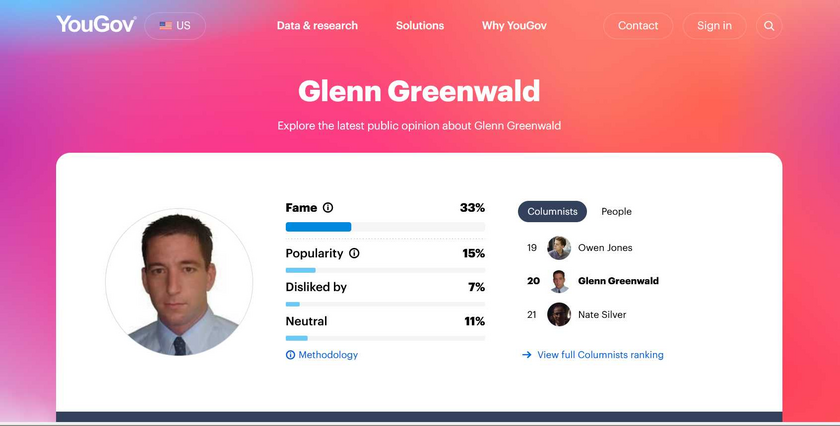Note From Glenn Greenwald: The following is the full show transcript, for subscribers only, of a recent episode of our System Update program, broadcast live on Rumble on Wednesday, February 1, 2023. Going forward, every new transcript will be sent out by email and posted to our Locals page, where you'll find the transcripts for previous shows.
Watch System Update Episode #33 Here on Rumble.
Virtually everything that can be said about our guest tonight, Marjorie Taylor Greene, has been said, often without the slightest regard for whether or not it is true. But whatever one's views of her may be, there is no denying that in a very short period of time – she is just now entering her second term in Congress – she has become one of the most prominent, influential and popular politicians in America.
As The New York Times recounted in an article on her complex history with current House Speaker Kevin McCarthy, when Democrats were plotting to strip her of all of her Committee assignments due to controversial comments she made on the Internet before she was even elected to Congress, she “stormed into Mr. McCarthy's office in the Capitol late one night, in February 2021, and handed him a letter signed by local Republican leaders in her district, urging him to keep her on committees. They had received “countless messages”, they said, from their voters who were intent on supporting her.”
Many things interest me about the Republican Congresswoman representing Georgia’s 14th Congressional District – her strident opposition to bipartisan foreign policy orthodoxy in Washington, the still escalating U.S. role in the war in Ukraine, her opposition to the evils of the U.S. Security State and Big Tech: all of which we'll talk about – but one often overlooked aspect of her quick rise to prominence is the Founders’ aspiration to have a country free of a professionalized political class, but instead one that would be governed by “citizen-legislators” – people who have other jobs and professions beyond “politician” and who go to Washington for a few years after a lot of experience elsewhere to serve in the model of public service and then go back to their regular lives.
Anyone who was able to construct a prominent political profile without decades of striving for political power, without drearily climbing the career ladder from low-level political office and trying to take a step up every few years, without the benefit of a famous political parent or a famous family name – in other words, a self-made person in Washington – is automatically someone who will be of greater interest to me than people who seemingly popped out of the womb dreaming of one day being in the U.S. Senate. Whatever else one might think of Congresswoman Alexandria Ocasio-Cortez, for example, that's true of her, and it's at least equally true of Congresswoman Greene.
Look at the two most senior politicians who lead their respective parties in the Senate. Republican leader Mitch McConnell has been a senator since 1985 – for almost 40 years. Other than a few years in the early 1970s when he worked as a lawyer, McConnell has never had any job outside of being a politician. The Democratic leader, Chuck Schumer, was elected to the New York State Assembly at the age of 24. He was elected to the U.S. Congress in 1980 at the age of 30, and then to the U.S. Senate in 1999. He's been in Congress for 43 years. It's impossible to find people more insular and insulated and aberrational than they – their lives bear not even the slightest resemblance to those whom they pretend to represent.
When AOC first ran for Congress, in 2018, almost nobody paid attention to her primary race, in large part because nobody had even heard of her opponent, Joe Crowley. That was the case, even though Crowley was one of the most powerful members of Congress: entrenched in House Democratic leadership and touted as the likely successor to Nancy Pelosi.
But almost nobody in his district even knew who he was. He barely visited Queens, the district he nominally represented. There was no such thing as a “Joe Crowley supporter”. His extremely significant power had nothing to do with any popular support – he had none – and it has everything to do with his ability to navigate the backrooms of Congress, where a lobbyist for Google and Raytheon lurk, telling party leadership, both parties, what they want, as they hand over massive checks to build their war chests. That's the reality of how Washington works and has worked for decades in both parties.
Marjorie Taylor Greene's power comes exclusively from popular support. Her relevance depends only upon one thing: the fact that, whether you like it or not, millions of Americans trust her, support her and will stand behind her. And that's what should matter.
Regardless of what you think about her causes and her ideology – and she is, needless to say, a deeply polarizing figure, as is almost everyone who holds genuinely passionate convictions as a matter of principle – I think one could say without much controversy that she's the most organic and authentic representation in Congress of the MAGA movement that attracted the support of tens of millions of Americans from every walk of life, from every racial and ethnic group and from every part of the country. And that just has to matter in politics. The fact that someone actually has large amounts of popular support. In Washington, for those who know how to wield it – and she has learned a lot about how to do so in the past two years – that's real power.
There was a reason that “citizen-legislators”, rather than a professionalized political class, was what the Founders envisioned. By definition, people have lived most of their lives without political power and political office has far more in common with those they are supposed to represent. They tend to be far more willing to learn, to grow, to evolve – not as the result of calculating careerist decisions, but simply because people who arrive in Washington afresh are not yet dependent upon it. They typically end up seeing things and learning things about how the country really works, and that, in turn, makes them less captive to party and dogma and more open to growth and change.
Congresswoman Greene is no ordinary member of Congress, and she's no ordinary Republican either. Many of her most passionately held views are ones that were utterly anathema to the Republican Party until Donald Trump came along in 2016 and became the Republican nominee for president not by affirming and validating long standing Republican orthodoxies – voters already had Jeb Bush and Marco Rubio if they wanted that – but instead, by denouncing and vowing to uproot his own party's establishment orthodoxies.
For that reason, Greene often inspires more anger and contempt in establishment Republican circles than she does among American liberals. Many of her views, her worldview, and her approach to politics, are a threat to subvert the GOP establishment and they know that. And that's why many of them despise her. But conservative voters also know that she's a threat to subvert the GOP establishment and that's why so many of them trust and support her.
There are a lot more views I have to share about Congresswoman Greene but rather than take more time for me to express those, I'd rather spend our time letting her speak for herself. I'm thrilled that she's here tonight to do just that.
G. Greenwald: Congresswoman, good evening. It's great to see you. Thanks so much for taking the time to talk to us.
Rep. Greene: Hi, Glenn. I'm thrilled to be here. Thank you for having me.
G. Greenwald: Absolutely. So, I was just talking about one of the things that I find interesting about your rise to prominence in such a short period of time, which is the pre-political trajectory you had, you didn't spend a lot of time plotting how to get elected to politics. You never ran for office. Previously, you had what I would describe as a life that has a lot in common with ordinary Americans. Talk about just in general, what your life was before you became Congresswoman Marjorie Taylor Greene, and how that shapes the work you do in Washington.
Rep. Greene: Well, I am just a regular American. I've never been in politics before, never held political office. I never even went to a meeting. As a matter of fact, I'm a business owner. Very proud mom, that's the best part of my life. And I just became angry over time with the failures that I saw in Washington, D.C., that regular Americans were able to get done every single day in our and our normal lives. Being a business owner and growing up in a family business, serving our customers was the most important thing we could do. I was raised with the belief that the customer is king, and I see the American taxpayer as the customer of the federal government. But I see complete failure from our federal government. We're basically on the brink of falling apart. So, I decided that instead of complaining on Facebook or social media or to my friends, I thought, okay, I'll step up to the plate and take a swing at this and see if I can do a better job.

























